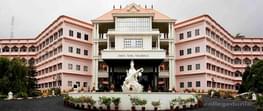Dr. S. Raja Mohamed is the Head of the Computer Science and Engineering Department at Kalaignar Karunanidhi Institute of Technology. He has an experience of 19 years in the teaching field. He has expertise in the fascinating fields of Bio-Inspired Computing and Robotics, Dr. Mohamed's academic journey culminated with a Ph.D. from Manonmaniam Sundaranar University. His leadership in the department is marked by his commitment to innovative teaching methodologies, research, and fostering a dynamic learning environment. With a specialization in Bio-Inspired Computing and Robotics, Dr. Mohamed brings a unique perspective to the world of computer science education, inspiring students to explore the exciting realms of technology.

How does your Institute enhance the skills of the faculty?
The institute prioritizes faculty development by actively engaging them in a range of workshops and FDPs conducted by renowned institutions and industries. A noteworthy initiative called FADS (Faculty Assessment and Development Scheme) is in place to promote research endeavors. This scheme encourages faculty to enhance their academic qualifications in line with UGC standards and pursue their Ph.D. Faculty members receive financial incentives for participating in FDPs, conferences, and publishing in journals. Additionally, faculty are encouraged to intern in industries for firsthand exposure to contemporary engineering technologies. Regular motivation for research proposals to esteemed agencies like AICTE, DST, and DRDO is also a significant aspect of faculty skill enhancement.
How does the curriculum of your institute ensure the best practice of the industry?
Our curriculum embraces the concept of Choice Based Credit System (CBCS) by incorporating an array of open elective courses. Aligned with the AICTE Model curriculum and APSHC framework, it emphasizes the reduction of the gap between industry and academia. To accomplish this, we offer industry-driven courses as credited electives and supplementary add-on courses, which go beyond the regular graduation requisites. This strategy not only facilitates placements tailored to specific industries but also cultivates essential skill sets. Complementing theoretical subjects, practical laboratory courses are conducted in collaboration with industry sponsors through a blended approach. Furthermore, students are actively encouraged to undertake industry-supported project work, fostering industry exposure. We also bolster students' prospects for higher education by organizing GATE preparation classes on campus. Additionally, we motivate students to participate in prestigious nationwide coding contests such as TCS Codevita, HackwithInfy, and Virtuasa Nueralhack to enhance their practical skills
What are the best practices offered that help the students gain necessary skills?
We foster a culture of self-driven learning by motivating students to engage in online courses provided by industry giants like Wipro and Infosys. Regular coding practice sessions are held on platforms such as HackerEarth and HackerRank to cultivate essential coding skills. Our commitment to practical application is evident through the monthly Codeathons and Hackathons we organize, allowing students to apply their knowledge in real-world scenarios. These initiatives form a comprehensive approach that equips our students with the necessary skills demanded by the industry.
How do you try to bring in a practical approach to subjects?
We emphasize a practical approach to subjects through advanced curriculum development and integration of domain-specific industrial practices. Our curriculum is designed to align with the latest industry trends and technological advancements. We regularly update our course content to incorporate real-world case studies, hands-on projects, and industry-relevant assignments. Collaborations with industry experts and guest lectures from professionals in the field ensure that students gain insights into practical applications and challenges. Additionally, we provide opportunities for internships, workshops, and industrial visits to bridge the gap between theoretical learning and practical implementation.
Check Kalaignar Karunanidhi Institute Of Technology Courses & Fees
How do you tend to establish healthy relations with the students and fellow faculty?
Maintaining healthy relations with both students and fellow faculty is a priority for us. I advocate for a student-centric approach to teaching, valuing their opinions and involving them in academic monitoring committee meetings. This fosters transparency and a sense of involvement. Regular interactions with students through open-door sessions allow me to understand their concerns and needs. Furthermore, I promote a collaborative atmosphere among the faculty by encouraging knowledge sharing, open discussions, and teamwork. This approach helps in building mutual respect and effective communication within the department.
What are your roles and responsibilities towards the students?
As the HOD of the CSE department, my foremost responsibility is to ensure the overall growth and learning of the students. I collaborate closely with the teaching and non-teaching staff to ensure the effective execution of academic, co-curricular, and extracurricular activities that contribute to the holistic development of students. I allocate roles and responsibilities to faculty members, ensuring students receive comprehensive guidance both in academics and personal development. Regular interaction with students helps me gather feedback and address any concerns promptly, thus ensuring a comfortable and conducive learning environment on campus.
What is your leadership style?
My leadership style revolves around fostering collaboration, innovation, and continuous improvement. I believe in empowering my team to explore new ideas and approaches while maintaining clear communication. I strive to create an environment where every member's strengths are harnessed for the collective growth of the department and its students.

![Kalaignar karunanidhi Institute of Technology - [KIT]](https://image-static.collegedunia.com/public/college_data/images/logos/1585142963Annotation20200325185541.jpg?h=71.7&w=71.7&mode=stretch)










![P.S.G College of Technology - [PSGCT]](https://image-static.collegedunia.com/public/college_data/images/appImage/1507718984cvr.png?h=111.44&w=263&mode=stretch)

![Amrita School of Engineering - [ASE]](https://image-static.collegedunia.com/public/college_data/images/appImage/12809_ASE_New.jpg?h=111.44&w=263&mode=stretch)

![Coimbatore Institute of Technology - [CIT]](https://image-static.collegedunia.com/public/college_data/images/appImage/1589976777Cover.jpg?h=111.44&w=263&mode=stretch)

![Sri Krishna College of Engineering and Technology - [SKCET]](https://image-static.collegedunia.com/public/college_data/images/appImage/15222_SKCET.jpg?h=111.44&w=263&mode=stretch)

![SNS College of Engineering - [SNSCE]](https://image-static.collegedunia.com/public/college_data/images/appImage/14841_SNSCE_New.jpg?h=111.44&w=263&mode=stretch)

















.png?h=72&w=72&mode=stretch)

 - 2024-03-14T191947.973.png?h=72&w=72&mode=stretch)
.png?h=72&w=72&mode=stretch)
.png?h=72&w=72&mode=stretch)
.png?h=72&w=72&mode=stretch)
.png?h=72&w=72&mode=stretch)
![Sri Ramakrishna Institute of Technology - [SRIT]](https://image-static.collegedunia.com/public/college_data/images/logos/1606225552Logo.jpg?h=72&w=72&mode=stretch)
![Sri Shakthi Institute of Engineering and Technology - [SIET]](https://image-static.collegedunia.com/public/college_data/images/logos/1617823187Logo.png?h=72&w=72&mode=stretch)
![SNS College of Technology - [SNSCT]](https://image-static.collegedunia.com/public/college_data/images/logos/1515732956SNSCollegeofTechnologySNSCT.png?h=72&w=72&mode=stretch)
![Kumaraguru College of Technology - [KCT]](https://image-static.collegedunia.com/public/college_data/images/logos/col28053.png?h=72&w=72&mode=stretch)
![SNS College of Engineering - [SNSCE]](https://image-static.collegedunia.com/public/college_data/images/logos/1585476680snslogo.png?h=72&w=72&mode=stretch)
![Hindusthan College of Engineering and Technology - [HICET]](https://image-static.collegedunia.com/public/college_data/images/logos/16175425401596177158HICET.png?h=72&w=72&mode=stretch)

![Sri Ramakrishna Engineering College - [SREC]](https://image-static.collegedunia.com/public/college_data/images/logos/1611572124Logo.jpg?h=72&w=72&mode=stretch)
![Coimbatore Institute of Technology - [CIT]](https://image-static.collegedunia.com/public/college_data/images/logos/1589976777Logo.png?h=72&w=72&mode=stretch)

![Karpagam College of Engineering - [KCE]](https://image-static.collegedunia.com/public/college_data/images/logos/1417071733karpagam logo123.jpg?h=72&w=72&mode=stretch)
![Sri Eshwar College of Engineering - [SECE]](https://image-static.collegedunia.com/public/college_data/images/logos/17172175491jun.jpeg?h=72&w=72&mode=stretch)

![KPR Institute of Engineering & Technology - [KPRIET]](https://image-static.collegedunia.com/public/college_data/images/logos/1654179889logooo.png?h=72&w=72&mode=stretch)
![Rathinam Technical Campus - [RTC]](https://image-static.collegedunia.com/public/college_data/images/logos/1651339751Untitled.png?h=72&w=72&mode=stretch)
![Coimbatore Institute of Engineering and Technology - [CIET]](https://image-static.collegedunia.com/public/college_data/images/logos/1472035230878787building logo.png?h=72&w=72&mode=stretch)

Comments